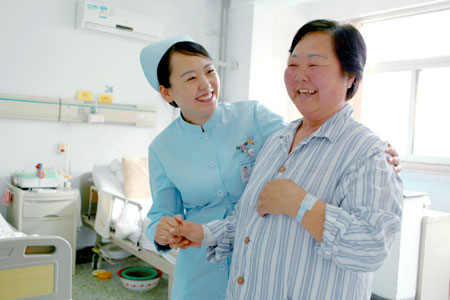Tale of a true survivor
Updated: 2013-12-24 08:54
By Liu Zhihua (China Daily USA)
|
||||||||
|
|
Wang Wei was close to death in 2008, but thanks to a chance encounter with a top doctor, the 26-year-old is now living a life she never dared hope possible. Liu Zhihua reports.
Wang Wei, 26, a nurse with China Meitan General Hospital in Beijing, is a regular guest on television.
Onscreen, she wears a long, thick ponytail and a big smile. Her eyes sparkle with vitality as she tells the audience her life story.
No one would suspect that she was once a cancer patient with little chance of survival.
In 2008, when she appeared on television for the first time, she was at the end stage of thyroid cancer. Doctors said she did not have long to live.
"I was waiting for death. But now, I'm as healthy as anyone else, and doctors say I can have babies if I want," Wang says. "It is like a dream."
Born in Yichun, Heilongjiang province, in 1987, Wang had a happy childhood growing up in an average urban family with three children.
But misfortune struck in 1995 when Wang discovered a pea-sized lump on her neck. Her parents took her to hospital only to be told she had thyroid cancer.
Thyroid cancer originates in the thyroid gland, and is a mild cancer that progresses relatively slowly.
But in the 1990s, treatment of the cancer in China relied largely on removal of the cancer tissues and even the whole thyroid gland. As a young child, Wang needed to keep her thyroid gland so her body would continue to grow.
Wang was 8 years old when the cancer was diagnosed. All she remembers is that she had an operation on her neck not long after the hospital visit and started to take all kinds of medicines.
Her parents didn't tell her what disease she had, and her life continued as usual.
What she did not know was that she didn't have health insurance. All the treatment and medicine she received were paid for out of her families' pockets. Her parents soon spent all their savings, and started borrowing money from relatives.
To make matters worse, in 1997, both of her parents lost their jobs.
To provide for three children and to make ends meet, her parents did all kinds of work, including picking up litter to sell, farming pigs and planting rice.
As the family became poorer and poorer, Wang started to become suspicious about her disease. "I felt different from the rest of the children, because I had to take a lot of medicines all the time," Wang says.
"And all the medicines I took had no labels. My parents had torn them off. They also avoided the topic of cancer, even when watching television."
She was always given the best food, such as meat and eggs, while her parents and sisters didn't eat any meat for months.
In 1998, Wang finally learned the truth. When another lump appeared on her neck, Wang's father told her that she had cancer, assuring her that all was in control and she would be cured.
She also discovered the medication she took were anti-cancer pills, substitute thyroid function medication and nutritional supplements.
At age 16, a checkup showed the cancer had spread, with cancer cells appearing in other parts of the body.
Her parents sold their apartment and took her to the best hospitals in Beijing.
She coughed blood constantly, and her neck was so swollen that she wore scarf or special clothes to hide it from curious eyes.
She underwent painful chemotherapy, which made her throw up and lose all her hair.
"I thought about death, so that I wouldn't cause further pain to my parents and my family," Wang says. "But my parents had done so much for me, and I couldn't just die."
To her family, she was a sweet daughter; to her teachers, an A-plus student who had studied hard despite the cancer; to her doctors, she was an optimistic patient who had postponed death miraculously time and time again.
But no one knew Wang cried at night, in fear of death.
During the Spring Festival dinner in 2008, Wang started to cough blood. The family fell silent. The television was on, broadcasting the happiness of others.
Wang then made a decision, which turned out to be a turning point in her life.
"I decided to write to my favorite television program Xingguang Dadao (Star Way, a talent show for ordinary people) to ask for a chance to sing on their stage," Wang says.
"I wanted to thank my parents for what they had done for me, and wanted to leave something for them to remember me by after I die."
She soon heard from the show's production team, who immediately arranged for her to sing on the show.
Wang appeared on television and the program's host told the story of her struggle with cancer, the devotion of her family and how she wanted to donate her body for medical study and organ transplants.
One viewer happened to be Wang Mingxiao, president of China Meitan General Hospital. He rarely watched television, but happened to tune in and was deeply moved by Wang's story.

The hospital president called the show's production team, offering free treatment to the girl. Viewers across the country also called and donated money to the family.
The hospital organized its best medical team and performed an operation on Wang Wei in April 2008 to remove the original cancer tissues, which lasted more than six hours. An average thyroid cancer removal operation lasts about two hours.
"She had an operation before, which made a second operation a great challenge. But without a new operation, she would have died," Wang Mingxiao says.
Luck was on Wang Wei's side this time. The operation was successful, and she soon started recovering.
As she recovered, the hospital president learned she used to be a top student in a key high school and decided to help her continue her studies. He used his connections and enrolled her in a nursing school in Heilongjiang province.

She graduated last year and became a nurse in the hospital.
Wang is popular with both colleagues and patients.
"She always smiles, and treats patients with kindness because she was once a patient and can empathize with them," says Wang Mingxiao.
Earlier this year, a regular checkup indicated that all the cancer cells in her body had disappeared, and her hair has become long and thick.
"I never dreamed I would live like I live now, being a medical staff member in a great hospital and being needed," Wang says.
"I just want to tell people to never let go of hope and everything will be good."
Contact the writer at liuzhihua@chinadaily.com.cn.
Most Viewed
Editor's Picks

|

|

|

|

|

|
Today's Top News
Snowden says mission already accomplished
China's space diplomacy starting to take off
Washington tries to shift spying blame to China
China's top 10 scandals in 2013
LA Winds blow into China
Private clubs are targeted by anti-graft campaign
China makes it easier to sue government
China promotes core socialist values
US Weekly

|

|
















